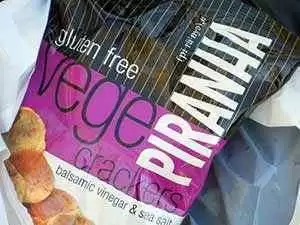
Celiac.com 01/14/2021 - It's no secret that most gluten-free food sales are for snack foods. It's also no secret that most gluten-free snacks are nutritionally inferior to comparable non-gluten-free snacks.
It's also true that the majority of people who eat gluten-free diet are doing so for dietary, rather than medical reasons. But does that mean we need to be worried about the nutritional well-being of people who adopt a gluten-free diet for non-medical reasons? The folks who grow, market and sell wheat and wheat products want us to think so.
Celiac.com Sponsor (A12):
The wheat industry gave some money to some food scientists and a behavioral economist from the University of Nebraska–Lincoln to try to figure out "why gluten-free foods have become so popular among those who aren't medically required to avoid gluten."
Their reasons for doing so are, of course, wholly altruistic, and their concern lies in the dietary health of people who might suffer poor nutrition by ditching wheat and eating gluten-free. "The gluten-free diet is a medical diet that's being adopted by people who don't really need it," said Kristina Arslain, who authored the paper as part of her master's thesis with the Department of Food Science and Technology at Nebraska.
The researchers note that 20% of non-celiacs surveyed said that they had tried a gluten-free diet. They also note that an estimated 25% of Americans follow a gluten-free diet. As fewer than one percent of Americans have celiac disease, and ~12% may have gluten sensitivity and/or gluten intolerance, the vast majority who give up wheat do so for non-medical reasons.
They claim they are looking to shed light on what attracts people to "fad diets," and they do present a few data points to suggest that, say, acne is a bigger motivator than weight loss. But, they give up the game early by making assumptions, and by feigning health concerns about people eating gluten-free for non-medical reasons.
The sentiment is echoed by Christopher Gustafson, an associate professor of agricultural economics who studies behavioral economics, who says that "One of the implications of going gluten-free is that you are probably going to end up with a diet that is less rich in whole grains. There's real public health and personal health reasons to be concerned about people voluntarily choosing the gluten-free diet when they don't have a diagnosed reason to do so."
Most Americans Self-diagnose to Adopt Gluten-Free Diets
So what? Most Americans do not follow a prescribed diet. They choose their diet based on myriad personal, cultural and economic factors, some solid and well reasoned, some capricious, some learned. This so called scientific paper looks a lot like concern trolling mixed with assumption and innuendo.
People are eating less wheat, with many avoiding it all together. This is a problem for the people who grow and sell wheat, not necessarily for people avoiding it.
Absent a medical reason to avoid gluten, anyone on a gluten-free diet is self diagnosing. Most people on a gluten-free diet self diagnose. So what?
We reject the idea that there are any extra health concerns associated with a nutritious, well-balanced gluten-free diet. This goes as much for people without celiac disease as for celiacs.
Many processed gluten-free foods are less nutritious than their non-gluten-free counterparts, which are still not very nutritious themselves. No question, processed foods are not particularly nutritious, and processed gluten-free foods are slightly worse, maybe.
However, there's no good science to support the idea that a gluten-free diet is necessarily any less nutritious than a diet that contains gluten. It depends on the diet. It depends on the individual. It depends on the choices.
A Gluten-Free Diet Can be Perfectly Nutritious and Healthy, Whether You Need it or Not
A diet rich in fresh fruits and vegetables, fiber, protein, and a moderate amount of fat is going to be healthier than a diet rich in processed foods. That's true for both a gluten-free diet, and a non-gluten-free diet.
The key is not the presence or absence of gluten. The key is the nutritional profile of the food choices. If the goal of the paper is to encourage non-celiacs eating gluten-free to pay close attention to making sure they are eating a well-balanced diet, then that's laudable.
However, beyond that, it's impossible to claim the a gluten-free diet is risky for non-celiacs without claiming that it's risky for celiacs, which has not been proven.
And, conversely, you can't argue that it's possible for people with celiac disease to eat a nutritious, well-balanced gluten-free diet, without also admitting that it's possible for non-celiacs to do the same.
There are myriad reasons why non-celiacs choose a gluten-free diet, and as many versions of what that diet can be as there are people.
There are just no good solid studies that support any "real public health and personal health reasons" to be concerned about people choosing the gluten-free diet, whether for medical or for non-medical reasons.
I'm pretty sure any number of nutritionists, or even a fairly educated layperson, can design a nutritious, well-balanced gluten-free diet, and also a non-gluten-free diet.
It may be a bit easier to eat unwholesome food of questionable nutritional value on a gluten-free diet, but it's not that much harder on a non-gluten-free diet.
The researchers pull back a bit by concluding that gluten-free bread-related products have improved in quality, and that people whose gluten-free and non-gluten-free diet includes more fruits and vegetables will very likely have better health outcomes than those who gravitate to cakes and cookies. Sure, a nutritious, well-balanced diet is important, gluten-free, or not.
People are eating less wheat, with many avoiding it all together. Some people mistakenly assume that avoiding wheat and gluten will automatically make their diet more nutritious than eating wheat and gluten, which is not true. But it's also not true that eating gluten-free is automatically less nutritious than eating wheat and gluten. It really depends on the choices of each dieter, on how much of which foods they eat and many other factors.
Absent real data on actual effects of a gluten-free diet, any concern "about people voluntarily choosing the gluten-free diet when they don't have a diagnosed reason to do so," is likely misplaced. That's especially true if the concern is funded by the wheat industry in the guise of thin, and largely empty studies, with equally empty conclusions, such as this one.
There are legitimate reasons for some people eating gluten-free for non-medical reasons to take a look at their choice, and their reasons for making it. There are good reasons to check with a doctor or a nutritionist. But, this study isn't especially helpful.
Let's translate: Cakes and cookies and processed foods are not especially nutritious, gluten-free or not. People who adopt a gluten-free diet, whether for medical or non-medical reasons, need to pay particular attention to nutrition, but so should people who don't eat gluten-free.
If you eat a gluten-free diet, for any reason, or if you eat a non-gluten-diet, you will do well to focus on eating nutritious, well-balanced diet, that provides suitable amounts of fiber, along with fresh, whole fruits and vegetables.
But certainly don't let a questionable study by the wheat industry scare you away from a gluten-free diet, if you decide that's the right diet for you.
Read more at Medicalexpress.com, and at news.unl.edu.







Recommended Comments
Create an account or sign in to comment
You need to be a member in order to leave a comment
Create an account
Sign up for a new account in our community. It's easy!
Register a new accountSign in
Already have an account? Sign in here.
Sign In Now